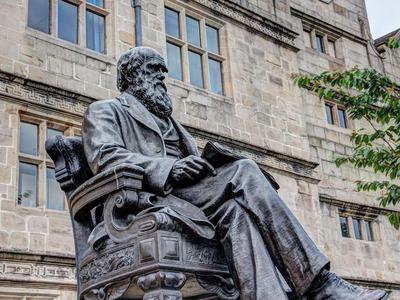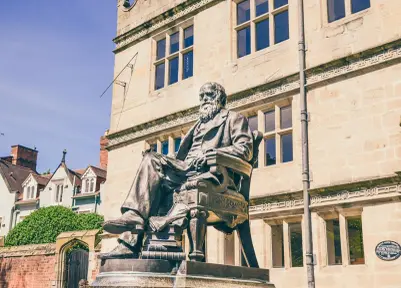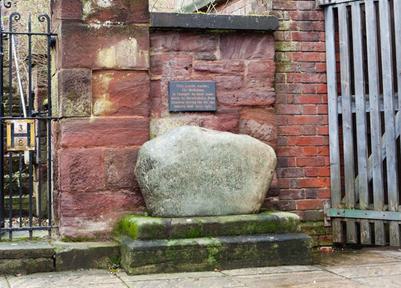- Features
- Charles Darwin in Shrewsbury
Charles Darwin in Shrewsbury

The father of evolution, Charles Darwin was born in Shrewsbury on 12th February 1809 at Mount House. Before attending Edinburgh and Cambridge University and sailing on the HMS Beagle, Darwin fished for newts in the Dingle and studied rocks in the Quarry Park.
Darwin was the second youngest of six children born to Robert Darwin and Susannah Wedgwood (daughter of Wedgwood pottery founder, Josiah Wedgwood), their family home on The Mount was built by Darwin's father. Darwin was baptised at St Chad’s Church and attended the Unitarian Chapel on High Street. Robert Darwin was a prominent doctor in the town, based in the Royal Shrewsbury Infirmary, which is now the Parade Shopping Centre.
Darwin spent much of his time exploring outdoors, partly due to the influence of his mother, who was a botanist and keen gardener. The unique topography of Shrewsbury fostered Darwin’s inquisitive mind, the ancient rocks across the town, in particular the Bellstone, provided him with a view into the Earth’s formative years, the loop of the River Severn promoted opportunities for aquatic exploration and the surrounding countryside housed bugs and creatures for Darwin to collect.
From the age of eight, Darwin attended Shrewsbury School as a boarder, in the building that now houses Shrewsbury Library. Darwin was not particularly studious and instead spent his time exploring the natural world. A statue of Darwin stands outside of his old school building.
Darwin spent the summer of 1825 as an apprentice doctor, treating the poor of Shropshire at the Royal Shrewsbury Infirmary, before leaving Shrewsbury to train in medicine at Edinburgh University. Darwin found lectures dull and surgery distressing and neglected his studies in favour of studying Natural History.
Darwin’s father, who was disappointed in his lack of interest in medicine, sent Darwin to Christ’s College, Cambridge to start a course as an Anglican priest. It was after his graduation from this course that he was invited aboard the HMS Beagle in 1831.
The HMS Beagle launched its five-year voyage around the world on 27th December 1831. During the trip, Darwin collected specimens from animals, plants and fossils from four continents.
Upon Darwin’s return to England in 1836, he used his unique experience of natural history to explore ideas of natural selection, where species that successfully adapted to their natural habitat thrived, while those that did not evolve and reproduce died off.
Darwin’s theory of evolution was ground-breaking and came with controversy, from fellow scientific peers and the public, it wasn’t until 1858 that he publically introduced his theory. In November 1859, Darwin published ‘On the Origin of Species by Means of Natural Selection’. He received criticism for the implication that humans were descended from apes and drew opposition from religious groups. Darwin’s theory has been the basis for modern theory of evolution since its publication.
Darwin died on 19th April 1882, at his family home in London. He was survived by his wife Emma, with whom he had 10 children.
Visit Darwin's Shrewsbury
Every year Shrewsbury comes together to explore Darwin's legacy at the DarwIN Shrewsbury Festival.
Find out more about Darwin's Shrewsbury in the 'Little Book of DarwIN Shrewsbury'.
Mount House is now operated as offices; visitors are able to walk onto the grounds of the house to take pictures. The gardens are currently being restored and are open to visitors at various day throughout the year. Find out more about Darwin’s Gardens.
Visitors to Shrewsbury can book a Darwin-themed walking tour through the Visitor Information Centre.
Find out more about Charles Darwin on the Darwin Online website.
You may also be interested in

Posted 16 September 2020
The Darwin Shrewsbury Trail
Shrewsbury's townscape formed the backdrop to many pivotal moments in Darwin’s early life. His story is written on the walls and cobbled streets of…

Posted 26 February 2017
The Little Book of Darwin in Shrewsbury

Posted 24 March 2018
The History of Shrewsbury's Bellstone
A young Charles Darwin’s first introduction to geology was a granite boulder, called the Bellstone, situated in Morris Hall courtyard in Shrewsbury…
